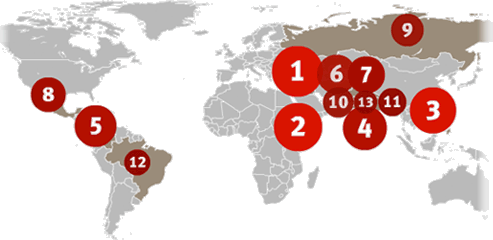While lethal anti-press violence has slowed considerably in recent years, the press freedom landscape remains troubled. Journalists continue to be attacked and threatened with such frequency that some are compelled to flee to safer locations within Colombia or into exile. A journalist in Arboletes was murdered in June, although the motive was unclear. In this violent context, press groups feared the potential consequences of statements made by former President Álvaro Uribe, who described veteran reporters Juan Forero and Claudia Julieta Duque as “terrorist sympathizers” after they wrote critical stories about the Uribe administration in The Washington Post. The national intelligence agency’s illegal espionage against journalists and other critics, a legacy of the Uribe administration, continued to be the subject of investigation. But progress was slow, with cases pending against more than 20 defendants in late year. In a blow to press freedom, the Supreme Court in May upheld defamation provisions in the penal code.
Colombia
» Threats against journalists on the rise, prompting some to relocate.
» Former President Uribe’s anti-press rhetoric sparks concern.
While lethal anti-press violence has slowed considerably in recent years, the press freedom landscape remains troubled. Journalists continue to be attacked and threatened with such frequency that some are compelled to flee to safer locations within Colombia or into exile. A journalist in Arboletes was murdered in June, although the motive was unclear. In this violent context, press groups feared the potential consequences of statements made by former President Álvaro Uribe, who described veteran reporters Juan Forero and Claudia Julieta Duque as “terrorist sympathizers” after they wrote critical stories about the Uribe administration in The Washington Post. The national intelligence agency’s illegal espionage against journalists and other critics, a legacy of the Uribe administration, continued to be the subject of investigation. But progress was slow, with cases pending against more than 20 defendants in late year. In a blow to press freedom, the Supreme Court in May upheld defamation provisions in the penal code.
-
5th
Impunity Index ranking -
94
Threats in 2011 -
20
Forced into exile, 2001-11 -
1
Murdered in 2011, motive unconfirmed -
5
Convictions in spying scandal
CPJ's Impunity Index found that Colombia is the world's fifth worst nation in combating deadly anti-press violence, with 11 unsolved murders over the past decade.

| 1. Iraq 2. Somalia 3. Philippines 4. Sri Lanka | 5. Colombia 6. Afghanistan 7. Nepal 8. Mexico | 9. Russia 10. Pakistan 11. Bangladesh 12. Brazil | 13. India |
The regional press group Foundation for Freedom of the Press (FLIP) found that the number of threats against journalists rose in 2011 after a decline the previous year. FLIP defines threats as direct intimidation of a journalist or the individual's family.
Threats in Colombia over time as documented by FLIP:
2007: 85
2008: 71
2009: 74
2010: 49
2011: 94
Mary Luz Avendaño fled Colombia in 2011 after receiving threats related to reporting she did on drug trafficking.
CPJ's annual survey of exiled journalists found that 20 Colombian editors and reporters were forced to leave the country in the past decade.
68 Somalia
66 Iran
55 Iraq
49 Zimbabwe
47 Eritrea
25 Sri Lanka
20 Colombia
18 Haiti
18 Rwanda
18 Uzbekistan
17 Gambia
Freelance journalist Luis Eduardo Gómez was murdered June 30 in Arboletes. CPJ is investigating to determine whether the motive was work-related. At least 43 journalists have been killed in Colombia in direct relation to their work since 1992; another 32 have been killed in unclear circumstances. Despite recent improvements, Colombia remains one of the world's most dangerous places for the press.
1: Iraq
2: Philippines
3: Algeria
4: Russia
5: Colombia
6: Pakistan
7: Somalia
8: India
9: Mexico
10: Afghanistan
Five former officials of the national intelligence agency DAS were convicted in connection with an illegal espionage program that targeted critical journalists, opposition politicians, and others from 2003 to 2009.
An ongoing inquiry:
22: DAS officials awaiting trial or being investigated, including former deputy director José Miguel Narváez, who is also accused of masterminding the 1999 murder of journalist Jaime Garzón.
5: Prominent journalists whose emails and phone calls the authorities have acknowledged were intercepted.
